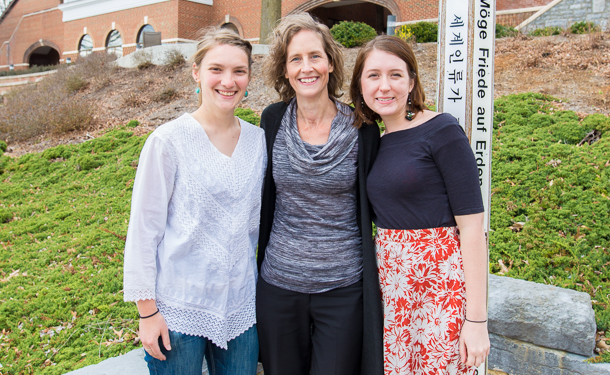In the best of cases, a college career is often a time of tumult and transition, a succession of new faces, a million conversations that begin with: “Where are you from?”
For students like Nika Hoefle, whose family had moved from Minnesota to a small city in northern Thailand when she was 14, that question doesn’t quite work like the simple ice-breaker it’s supposed to be. Telling people she’s from Thailand – which she considers home – can be awkward. It can almost come off arrogant. It often just brings the conversation to a halt.
“People don’t really know how to interact with you,” says Hoefle, a senior majoring in history as well as peacebuilding and development. “The questions that people ask once they’ve figured out that you’ve lived abroad can be vague and difficult to answer.”
E.g: “Oh… What was that like?”
How are you supposed to answer something like that?
Hoefle is what’s known as a third-culture kid, or TCK. The term was coined decades ago to describe someone who’s spent a “significant part” of their formative years living in a country or culture different from their parents’. The “third-culture” bit refers to the mixed identities they develop as a result, neither fully belonging to their parents’ culture, nor to the one(s) in which they’ve lived.*
About dozen on campus
The definition of a TCK is somewhat nebulous, and EMU doesn’t track official enrollment numbers of students who consider themselves to be TCKs. But based on participation in a special orientation held prior to the start of each academic year, more than a dozen TCKs are now studying at EMU.
One of Hoefle’s classmates and fellow TCKs, Alena Yoder, lived in Kenya from second to seventh grade. Though the two lived overseas in entirely different parts of the world, they share the experience of feeling like outsiders, at times, in the country where they hold citizenship.
“For a long time, I just didn’t fit in,” says Yoder, a senior history major.
She struggled to make friends and recalls her eighth-grade year after her family’s return to Indiana as the worst of her life.
Hoefle and Yoder are co-presidents of a TCK club that meets monthly on campus to discuss their experiences of adjustment, challenge and growth. About 10 students have been active in the club this year.
“It’s definitely a support group,” says Hoefle. “What we try to do as a club is be a safe place for people to talk about what’s going on … Without that strong support group at EMU, I don’t know how my transition would have gone. I can’t really imagine it without those people, even though we were from such different places.”
More than 20 TCKs among faculty and staff
Lori Leaman, an education professor and faculty sponsor of the TCK club, said the group “provides that safe space for challenging each other but also for providing support during the challenging times.”
“I think it is [also] a place where they can experience a sense of home – home that lies in relationships, not in geographical location,” she added.
Leaman co-sponsors the club with her husband, Jim Leaman, a business professor who grew up in East Africa and is among the nearly 20 EMU faculty and staff who are TCKs. Lori Leaman says the large presence of TCKs across the entire university community, along with the focus on cross-cultural understanding that permeates the curriculum, makes EMU a particularly supportive place for TCK students. (The Leamans also spent 12 years in Nairobi, Kenya, where both of their children were born.)
“I think the emphasis on ‘the common good’ for every single person on this globe resonates with TCKs,” she continues.
A ‘comfortable’ place
As their graduation rapidly approaches, Yoder and Hoefle both say they’ve had great experiences at EMU.
“There are people here on this campus who very much understand that TCK narrative,” says Yoder, who plans to stay in Harrisonburg after graduation. “It feels comfortable here to be a TCK.”
As a legacy of her past, Hoefle expects she’ll always have an unconventional notion of “home,” one that’s not necessarily rooted to one specific place. Sometimes, she says, she’s jealous of peers who have deep, deep roots in one particular community. Other times, she’s grateful that her life has been so varied.
“I don’t think it’s better or worse to have lived abroad,” Hoefle says. “It just depends on what you do with it in the end.”
Read Hoefle’s opinion piece published in the Weather Vane, “The Truth About Being a Third Culture Kid.”
* Definition adapted from: Pollock, David C. “Being a Third-Culture Kid: A Profile.” Raising Resilient MKs: Resources for Caregivers, Parents, and Teachers. Colorado Springs, CO: Association of Christian Schools International, 1998. 45-53.
